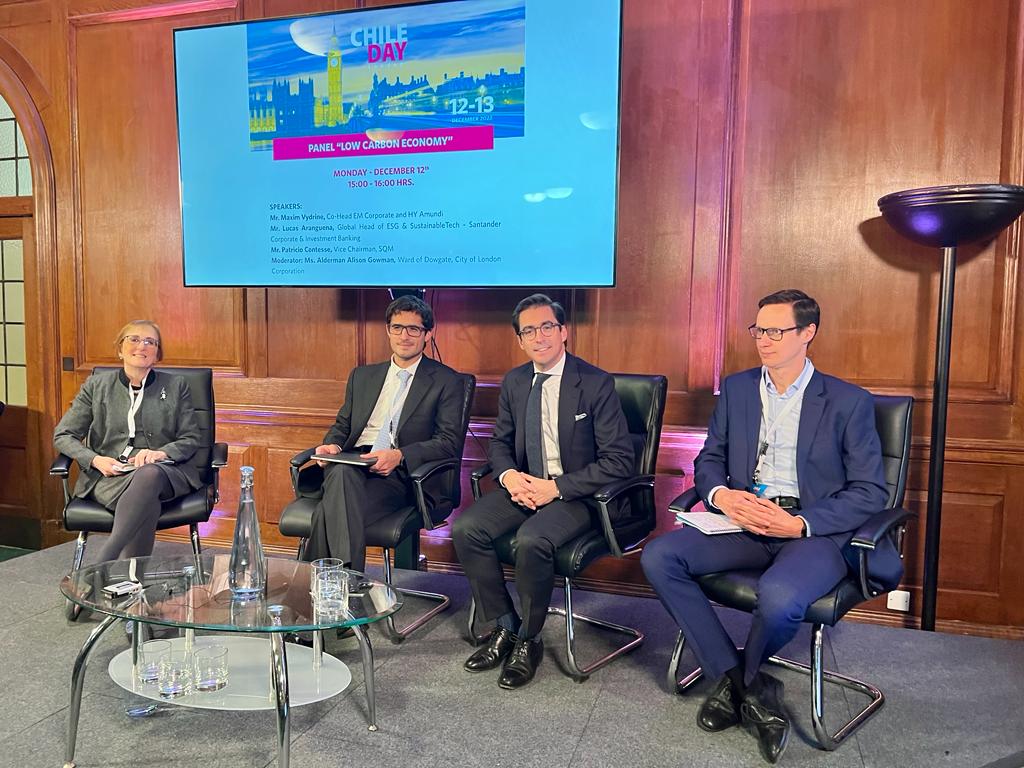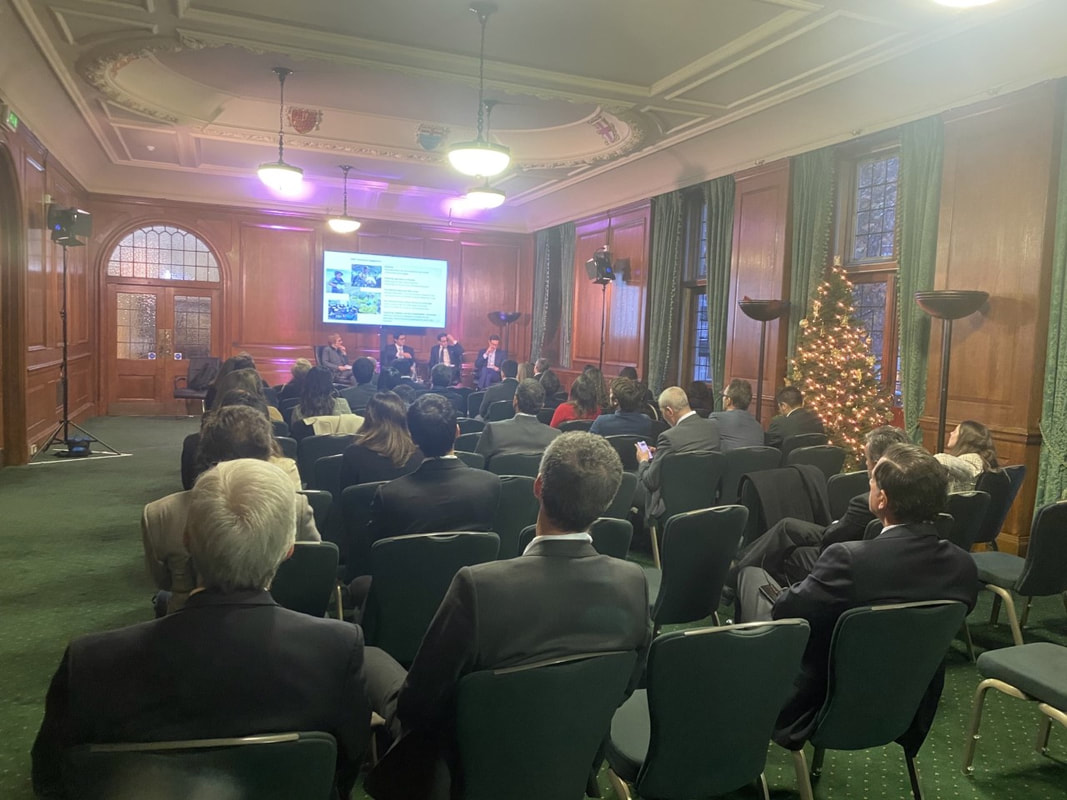 Chile Day Low Carbon Economy Panel Alison Gowman, Patricio Contesse Fica, Lucas Aranguren and Maxim Vydrine Chile Day Low Carbon Economy Panel Alison Gowman, Patricio Contesse Fica, Lucas Aranguren and Maxim Vydrine It was good to participate again on behalf of the City of London Corporation in the annual meeting for Chile in London. Despite the snow and train disruption the attendance and engagement was high. I led the session on the Low Carbon Economy with a panel consisting of Maxim Vydrine, who co-heads Emerging Markets Corporate and High Yield team at Amundi, Lucas Aranguren, Global Head of ESG & SustainableTech - Santander Corporate & Investment Banking and Patricio Contesse Fica, Vice Chairman of SQM. I was happy to speak about the leadership role that the UK had taken bolstered by the Presidency of COP26 in Glasgow. The UK leads the league tables for signatories to the Net Zero Banking Alliance, part of the UN Environment Programme Finance Initiative (UNEPFI). More UK financial services firms have science-based net zero strategies than those in other markets. Businesses seeking funding for sustainability projects can find investors with the appetite and expertise to invest in green in the UK. In other words, green ESG and low carbon investing is growing so that it is becoming the norm rather than the exception. Some of this is voluntary, driven by investor and stakeholder demands and some is regulatory governed both by the Government and Financial Conduct Authority. The UK Government has been driving this agenda by: • Committing to the UK being the world’s first net zero aligned financial centre, • Making it mandatory for firms across the economy to disclose their climate-related risks and opportunities – the first G20 country to do so. New Companies Act requirements came into force from April 2022, making climate-related disclosures mandatory for large UK-registered companies, including private companies. There are plans to make it mandatory for financial firms to publish transition plans. A Transition Plan Taskforce has been established to set the gold standard in this area, • Delivering on its green finance roadmap, • Continuing working with the UK industry and regulators to implement the recommendations of the Asset Management Taskforce’s stewardship report which seek to enhance and embed stewardship across the investment chain. This supports the world-leading stewardship standards set out in the Financial Reporting Council’s UK Stewardship Code 2020. In March 2022 the Code had 199 signatories including asset managers with £33tn in global assets under management. • Promoting global consistency and comparability in sustainability reporting, enhanced climate-related financial disclosures and improved transparency in ESG. This will not only make the transition easier and more cost-effective for businesses but will also help drive the change needed to achieve net zero, • Continuing to develop the UK’s green taxonomy, which sets out the thresholds at which specific economic activities count as environmentally sustainable and • Continuing to invest and grow voluntary carbon markets. The UK Voluntary Carbon Markets Forum was established in April 2021. In response it was good to hear about the early start that Chile made in issuing green Sovereign Bonds, including in 2022 a sustainability linked bond. The capital markets are moving fast to encompass green and ESG principles. Amundi has committed to a net zero methodology that makes it a leading asset manager in this area. Whilst the Chilean Association of Investment Fund Managers calculated that there is about $6 billion under ESG principles this is still growing fast. Investments in green bonds are growing faster than those not so branded. Lucas Aranguren of Santander spoke of the strides being made to transition to low energy. Chile is leading in the production of green hydrogen and batteries as well as e-mobility, These are needed to help the world’s change of dependence on fossil fuels. However the transition is not easy and there often needs to be a synchronicity of infrastructure to make it all work efficiently. SQM spoke about how it is working with the communities and landscapes in which it is placed and that its use of water and natural resources is fast reducing due to technology and proper engagement. They have created a holistic approach so that they are not just looking at low carbon but the widest of remits around social issues and governance – their Board Chair is the lead and in direct touch with the local indigenous communities. The exploration of ideas with an engaged audience added to the benefit of the day and the continuing good relationship between the UK and Chile. ere to edit.
0 Comments
Your comment will be posted after it is approved.
Leave a Reply. |
Details
AuthorAlison Gowman Archives
January 2024
Categories
All
|
Follow Alderman Alison Gowman on Twitter: https://twitter.com/GowmanAJ
Alison Gowman: As an elected Alderman within the City of London: https://democracy.cityoflondon.gov.uk/mgUserInfo.aspx?UID=229
Privacy policy: https://www.alisongowman.org/privacy.html
Cookie policy: https://www.alisongowman.org/cookies.html
Terms & conditions of website usage: https://www.alisongowman.org/tandc.html
Alison Gowman: As an elected Alderman within the City of London: https://democracy.cityoflondon.gov.uk/mgUserInfo.aspx?UID=229
Privacy policy: https://www.alisongowman.org/privacy.html
Cookie policy: https://www.alisongowman.org/cookies.html
Terms & conditions of website usage: https://www.alisongowman.org/tandc.html


 RSS Feed
RSS Feed